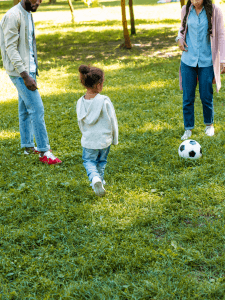The Isolating Struggles
Any parent who has a child with food allergies can tell you what a challenging experience it is. The constant fear of harm, anxiety about contamination/contact, accommodations that need to be made for safety, and more, take a toll on the food allergy parent.
While other children are picking their favorite foods from the grocery store, you’re meticulously searching for safe foods. You have probably become an expert on how to read food labels at this point. Depending on your child’s age, they may be becoming an expert, too. Some institutions, especially schools, have slowly become more accepting and accommodating of food allergies by creating safe classrooms and reserved lunch tables. It is also more common (though not common enough) for managers and chefs at restaurants to be prepared to answer questions about the preparation of food in their kitchens. In the best case scenarios, others understand the weight of these life-threatening concerns and do their best to provide a safe and welcoming environment for you and your child.
Unfortunately, on the other hand, food allergy parents are often met with skepticism in the form of questions and comments such as…
- Oh, he’ll be fine. Don’t worry so much.”
- “Is it really that serious?”
- “Back in the day these things weren’t a big deal. Are you sure she really is allergic?”
These questions and comments can leave parents feeling isolated in managing their child’s life-threatening condition.
Taking a Toll
Food allergy parents have so much to consider when keeping their child safe. Often the anxiety and stress related to food allergies comes between parents, breaking down their teamwork and bond. It’s common for food allergy families to argue over food choices, disagree on how to manage the family (especially when siblings are involved), and hold differing views on how to approach this potentially life-threatening issue. Unfortunately, this can cause a divide in the family that is many times felt by every member.
When a child’s food allergy causes anxiety and stress in the family, this often causes one parent to “overfunction” while the other “underfunctions”. What does this mean exactly? Here are a few examples:
-
- Dad thinks Mom is overprotective of Daughter, who has life-threatening tree nut allergies. Mom always carries an Epipen in her purse, while Dad doesn’t think this is necessary. As Mom becomes more anxious, Dad becomes less engaged with Mom and Daughter, stating he “can’t deal” with Mom. Daughter observes this divide between Mom and Dad and becomes anxious, unsure of who to trust.
-
- Dad has a close bond with Son who has Celiac Disease. Mom often forgets to buy safe food at the grocery store for Son to eat. Dad notices this and complains to Son about Mom. “Can you believe Mom didn’t get your snacks? This is ridiculous. I’m going to the store now for you. Don’t worry; Dad will take care of you”. This results in Son mistrusting Mom, while Dad builds resentment towards Mom.
- Mom and Dad are divorced and trying to co-parent effectively. While Mom and Dad are on the same page when it comes to Daughter’s sensitivity to dairy, Step Dad thinks that food allergies are “just a trend”. When Step Dad teases Daughter about avoiding dairy, Daughter calls Dad crying. Dad has tried to talk to Mom about this, but Mom says Step Dad is “old-fashioned, and is teasing Daughter lovingly”. This has caused tension in Mom and Dad’s co-parenting relationship, which was previously effective.
In the examples listed above, the teamwork between parents has crumbled. Instead of resolving issues together, the parents are turning against one another, often involving the children. It’s no surprise that this deeply affects the kids. When food allergy parents aren’t on the same page, it can result in anxiety throughout the family, resentment in the co-parenting relationship, and conflicts in other areas of parenting. In order to repair these rifts, parents must first start with shared goals.
The Shared Goal
Food allergy parents who are not on the same page often forget that they share the same goal: keeping their child safe. While the approaches to this goal may differ, it is important to have a discussion with your co-parent that always comes back to the shared goal.
During these discussions, remember to assume good intent. By entering the conversation with an optimistic mind, you are improving the chances of a positive result. Remember that assuming that your co-parent is out to undermine you will likely result in defensiveness. Therefore, remind yourself that your co-parent cares about your child’s safety, even if their attempts may be misguided. Whether your co-parent is overfunctioning or underfunctioning, just like you, they’re doing their best to manage this struggle. Consider starting with a prompt such as:
“I know that you care about keeping Daughter safe. Even though our approaches differ, I’d like us to start working better together”.
You & Me VS. The Problem
In the examples listed above, parents are working against one another to keep their child safe. In other words, it’s You vs. Me. A more effective approach to the shared goal is You & Me vs. The Problem.
Imagine a soccer game where Mom and Dad are playing defense. The opponent is coming to score a goal, and Mom and Dad are competing with each other to block the goal. While they push and shove each other out of the way, they become distracted and the opponent scores. Had they been working together, they would have been able to block the goal. This is a You vs. Me approach.
In a You & Me vs. The Problem approach, Mom and Dad come up with a game plan. One parent might say to the other: “I have a difficult time playing defense when you jump in front of me. Can we change how we do that?” In this approach, your co-parent is your teammate. In order to reach your shared goal, you’re working together and relying on one another. You understand that stonewalling your teammate or assuming the worst in them will only make this more difficult. Remember that when it comes to food allergies, Mom and Dad are either winning together or working against one another.
Meeting Your Child’s Needs Together

In parts 2 and 3 of this blog series I share my twist on Maslow’s Hierarchy of Needs while providing practical solutions for you and your co-parent to meet your child’s food allergy needs. Stay tuned!
Check out the whole series:
-
5 Key Ways to Improve Co-Parenting Your Child with Food Allergies: Part 2 of 3
-
5 Key Ways to Improve Co-Parenting Your Child with Food Allergies: Part 3 of 3
Learn more about our Food Allergy Services
Contact us for a free phone consultation.
Connect Now






3 thoughts on “5 Key Ways to Improve Co-Parenting Your Child with Food Allergies: Part 1 of 3”
Comments are closed.